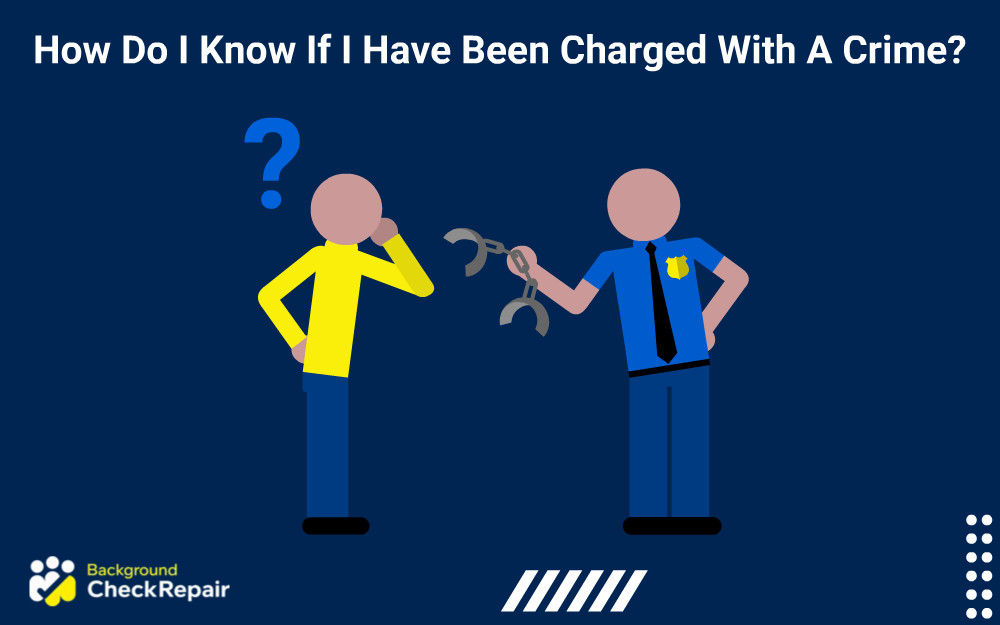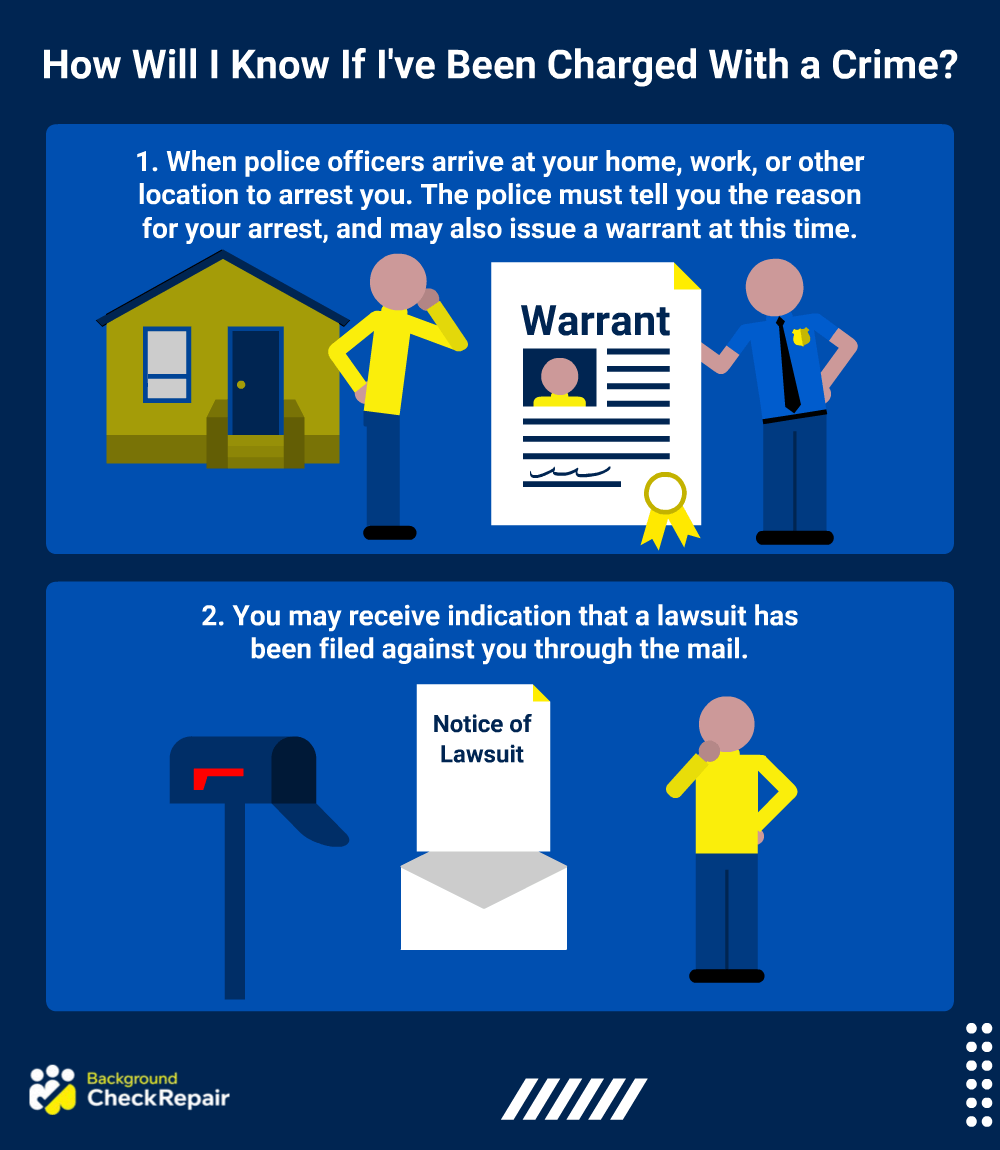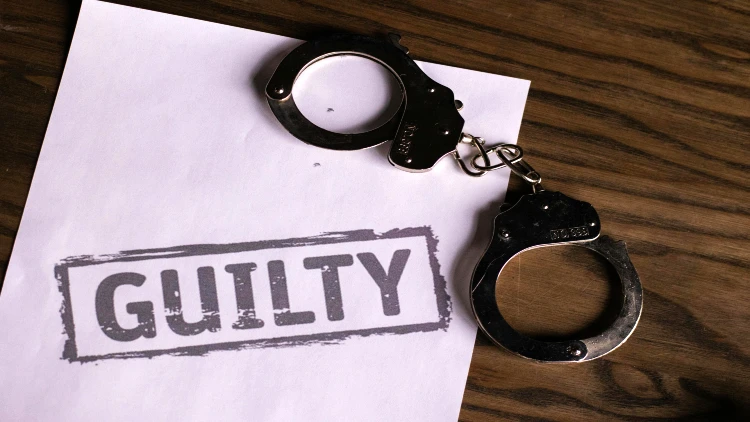We use cookies to ensure that we give you the best experience on our website. If you continue to use this site we will assume that you are happy with it
How Do I Know If I Have Been Charged With a Crime? (Try This Now)
 Written by Background Check Repair
Written by Background Check Repair
Criminal Records | June 14, 2024

If you are unfamiliar with the criminal justice system, or think you may have broken the law, you may be wondering: how do I know if I have been charged with a crime?
Being charged with a crime can be confusing and frightening, especially if you have not committed the offense. If you believe that the police may be investigating you, and are planning to press charges, it is important to understand what this means for you, and what rights you have. And, there’s one thing you can try right now, to find out for sure.

When you’ve been arrested, time is of the essence, so you can start building a defense to remain free of convictions.
So, if you’re still wondering, “how do I know if I have been charged with a crime,” the following information can help you find out for sure if you’ve been charged, and then show you how to confront these charges.
Try This Now:
Go to your local sheriff’s office website and look for “arrest warrants.” For example, if you live in a county in Texas, you can search arrest warrants for your county. But this is true for all states. You can also go to your county’s court clerk office, and look for “active warrants.” Since arrest warrants are public information, both options can be used to search your name, and other identifiers, to discover if you have been charged with a crime. Some counties and areas around the country may have a website that is difficult to find; if you need help you can reach out to us from our contact page.
If you’re wondering, how do I know if I have been charged with a crime at the federal level, and suspect there may be a federal arrest looming, you can perform a search on federal warrants online as well.
How Am I Notified of a Criminal Charge? What Are Court Summons?
There are several ways you may be notified that you have been charged with a crime.
The first and most obvious way to discover your charges is when police officers arrive at your home, work, or other location to arrest you.
During your arrest, the police must tell you the reason for your arrest, and may also issue a warrant at this time.
During your arrest, you should not resist or argue with the police, and insist that you will not answer any questions until you get a lawyer. Remember, anything you say can be used against you.1
You can (sometimes) avoid this by checking to see if a warrant has been issued for your arrest, and if so, make arrangements to speak with a lawyer who can advise you on the best steps to take before cops show up.
However, you may receive indication that a lawsuit has been filed against you, such as through the mail. If you are being charged with a crime, this letter will notify you of the date for an arraignment. An arraignment is the first court visit after criminal charges are filed, where the judge explains your charges and asks for you to enter a plea.
An arraignment for a criminal charge may also be known as a clerk magistrate’s hearing. If you plead guilty, you may be taken into custody to await your trial. An attorney and their associates can help show you the options for your plea. Depending on the severity of the crime, bail may or may not be posted for the defendant, especially if they plead guilty.1
An arraignment is distinct from a trial, as it is not used to determine your guilt or innocence. It is simply to enter a plea and begin the case process. No witnesses testify, no lawyers show evidence, and there is no conviction. At your arraignment, you may request a public defense lawyer if you do not already have one, which is free, or have your own private attorney present.2
However, it is recommended that once you receive your summons, you contact a criminal defense attorney promptly, to ensure you have the greatest chance of being absolved of the alleged crimes. If the criminal charges filed against you are federal offenses, you should be particularly cautious. For federal criminal cases, the sentencing is often more harsh, as the crimes are more serious. As a result, you should hire a federal criminal defense attorney, who has experience in this specific area of law, so you have the best chance of fighting your case.
Offenses that lead to a federal warrant include: certain sex crimes, drug trafficking, and kidnapping. In some cases, it is possible for an individual to be tried for these crimes in both federal and state courts, which is often done for drug crimes and other crimes with laws differing state to state.2
If you are worrying, “how do I know if I have been charged with a crime,” it is also important to understand the aftermath of a potential conviction. There are consequences for breaking the law.
What are Criminal Conviction Records? What are the Implications of my Case?
A conviction is when a court of law finds a defendant guilty of the crime charged against them. This only occurs after a trial, where the defendant has the opportunity to provide a criminal defense, with the help of a lawyer if they choose.3

(Image: KATRIN BOLOVTSOVA6)
Many people wonder, Do criminal records include dismissed charges? The truth is, it depends on a number of factors, but after your case is filed, your charges can be dismissed for a number of reasons by the prosecuting attorney or office. For instance, it can be dismissed if new evidence comes to light, a new suspect is determined, or a similar reason. Despite your case being closed, these crimes may still appear on a background investigations.
Whether you were tried on the federal, state, or local level, the respective jurisdiction stores criminal conviction records, and criminal record criminal convictions may be accessible to the public. For example, in the United States, the national government records criminal records online via a database. Any person may conduct a public records criminal search, to access federal case documents in real-time, and get information on how particular criminals have broken the law. If you have a criminal record, criminal information from all of your cases will likely be available online. A national database records criminal conviction information from all states.
Criminal public records typically show the name of the criminal, the charges filed against them, the crimes they were convicted of, if charges have been dropped, when the crime occurred, and other information related to the criminal. The record will also reveal if it is a federal crime, state crime, or other violation of the law.4
If you are convicted of the crime, depending on its severity, you may serve prison or jail time. However, you may have the option to walk free before your sentence is complete, if you are eligible for parole, or early dismissal based on good behavior. This rewards inmates for their behavior, and allows them to transition more successfully back to society, after serving time for their crimes. Alternatively, a judge during your trial may assign you probation. This is a period where an offender can avoid jail time, by agreeing to no longer break the law and reporting to an assigned supervisor or officer. When the terms are violated, the criminal will be sent to prison.5
If you will be arrested or charged with criminal conduct, contacting a criminal defense lawyer immediately can help. If you have been charged with a federal offense, such as related to drug possession or trafficking, time is even more of the essence, to ensure your lawyer can collect evidence to show your innocence and provide an adequate criminal defense to prove you’re innocent.
If you suspect that you’ve been charged with a crime, the first thing to do (right now) is perform an arrest warrant search. You can either do this yourself, can contact a criminal defense attorney, or conduct a professional background search on yourself. Knowing the answer to the question, “how do I know if I have been charged with a crime,” will help you determine whether you need to hire a lawyer, and ultimately can increase your chances of walking home free.
References
1The Law Offices of Gerald J. Noonan. How Can I Know if I’m Being Charged with a Crime? 7 June 2021. 27 October 2021. Web. <https://www.noonanlawma.com/how-can-i-know-if-im-being-charged-with-a-crime/>
2Groth & Associates Attorneys at Law. How Do I Know I Have Been Charged with a Crime? 22 December 2020. 27 October 2021. Web. <https://www.grothlaw.com/how-do-i-know-i-have-been-charged-with-a-crime/>
3Wikipedia. Conviction. Nd. 27 October 2021. Web. <https://en.wikipedia.org/wiki/Conviction>
4Nolo. Can I check out another person’s criminal record? Nd. 27 October 2021. Web. <https://www.nolo.com/legal-encyclopedia/question-criminal-record-check-another-person-28151.html>
5National Institute of Corrections. Probation and Parole. Nd. 27 October 2021. Web. <https://nicic.gov/projects/probation-and-parole>
6Photo by KATRIN BOLOVTSOVA. Cropped, Resized, Changed Format. Pexels. Retrieved June 13, 2024, from <https://www.pexels.com/photo/a-stainless-steel-handcuff-6077431/>
